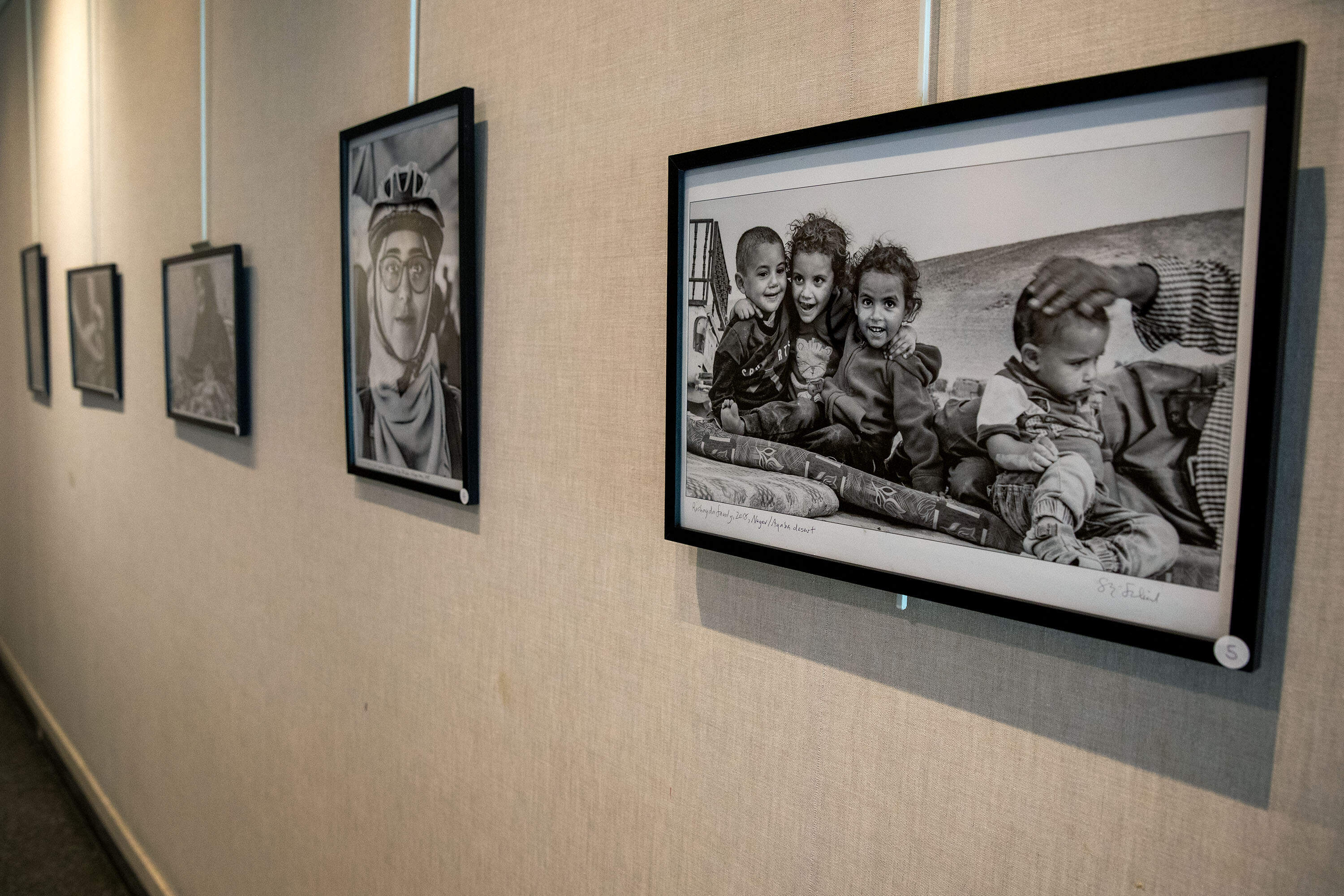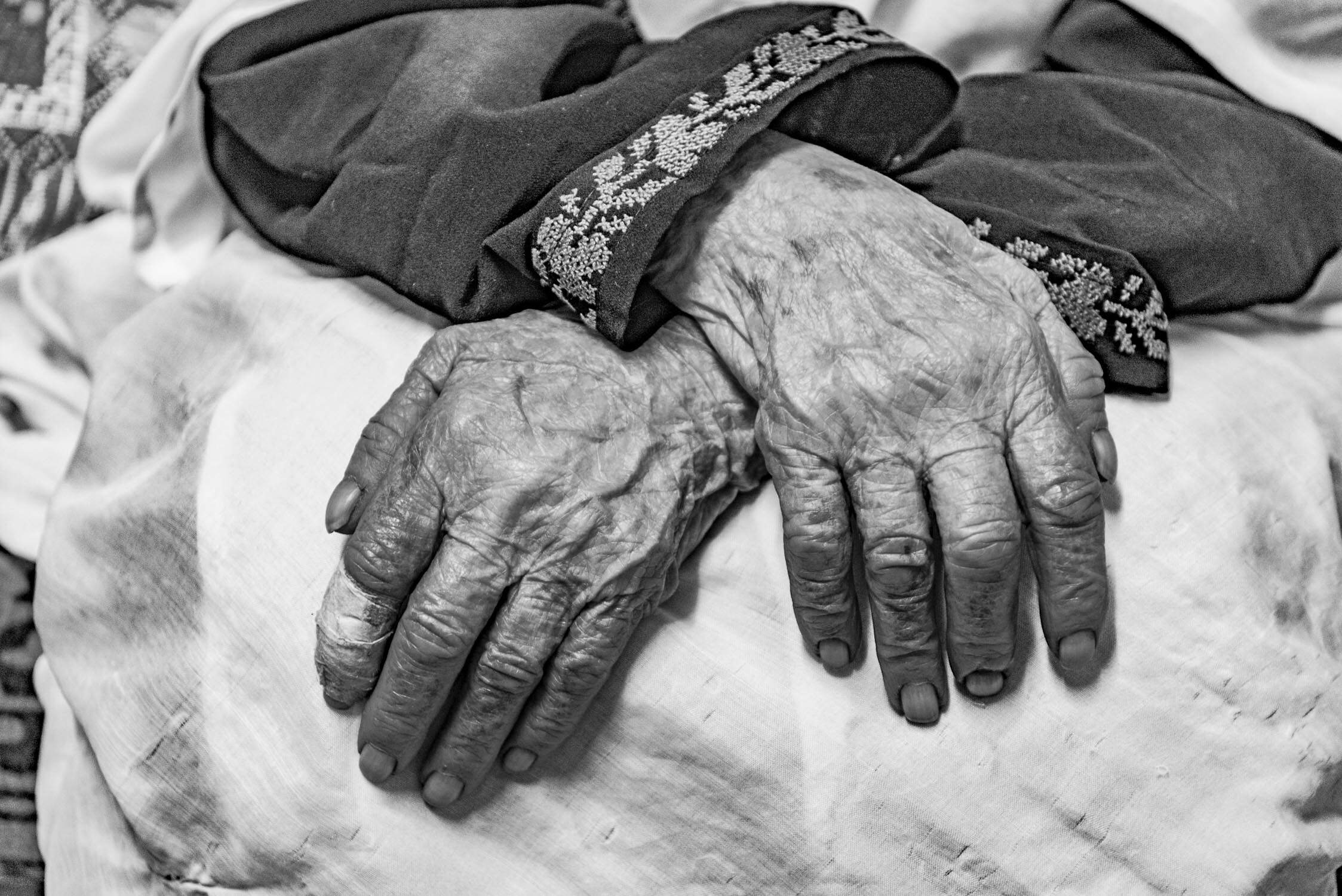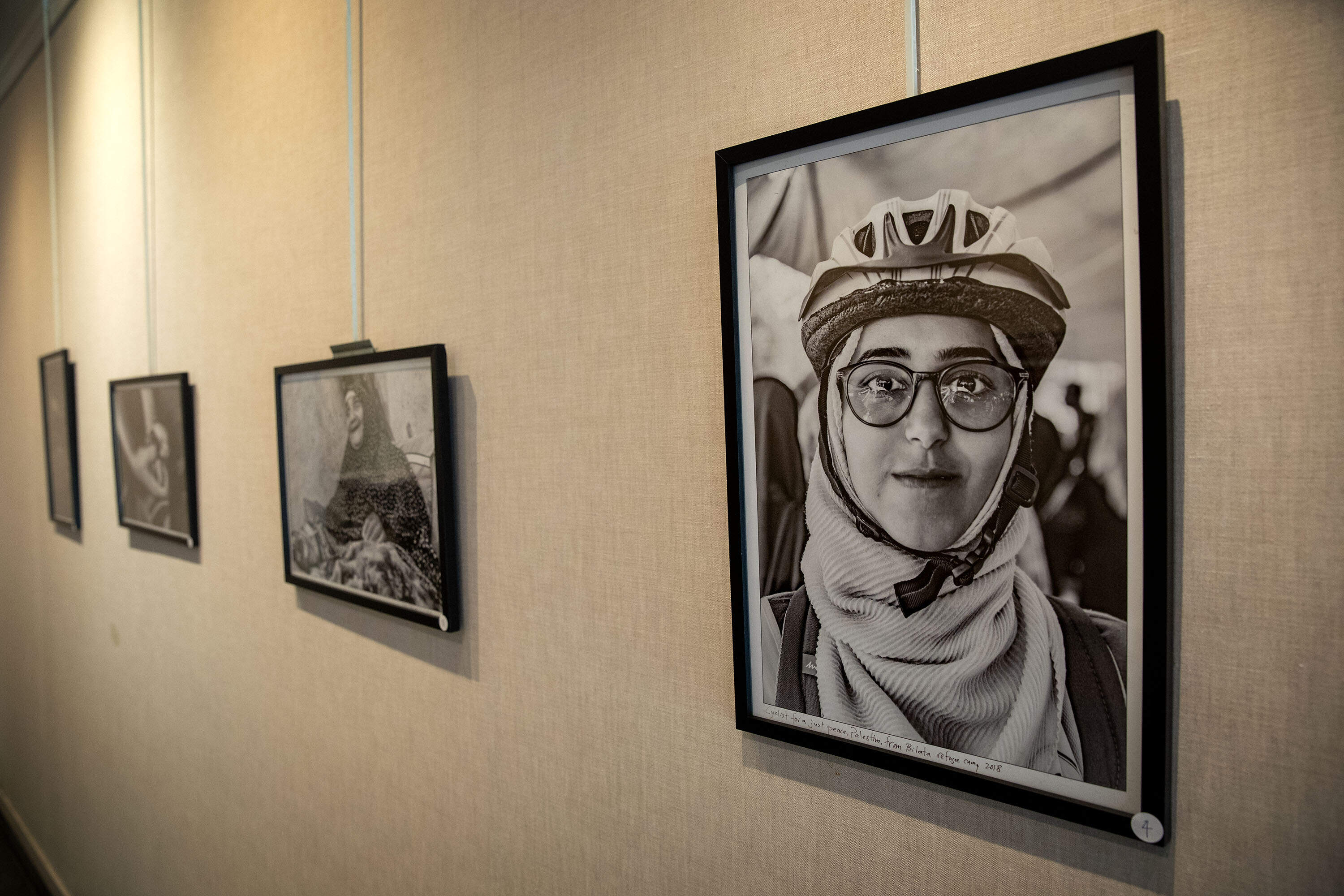Advertisement
A photography exhibit about the West Bank ignites tensions in Newton
Resume
A photography exhibit at the Newton Free Library has ignited outrage in the wealthy Boston suburb, sparking questions about free speech and the role of public libraries in civic discourse.
The exhibit, by Cambridge photographer and activist Skip Schiel, shows portraits of displaced Palestinians in the West Bank and the locations where their families once lived in Israel. Several hundred protesters, as well as supporters of the exhibit, showed up to the exhibit’s reception on May 9, where three Palestinian residents of Newton were to speak on a panel.
But protesters effectively shut down the event before it could begin.
Event organizers described a tense scene inside the library, with pro-Israel protesters taking over the front row of seats and carrying fliers referencing “jihad” and other anti-Arab language. A video circulating online shows one protester calling the scheduled speakers “terrorists.”
Newton police were onsite at the event, which quickly devolved. Organizers were interrupted by shouts of “liar,” “shame” and “antisemite,” while pro-Palestinian attendees responded with chants of “free Palestine” and “from the river to the sea.”
Library staff had left the building and locked up the PA system, so Schiel tried to give his speech over the commotion without amplification.
“Nobody could hear me, even in the front, with all the noise, with all the shouting,” the photographer recalled.

Event organizers soon gave up on the reception and led their supporters outside to nearby Newton City Hall, where the chaos continued. Protesters waving Israeli and American flags heckled panelists trying to give speeches.
Things had been heating up for weeks. Newton was still reeling from an incident in March in which a display of posters of Israeli hostages taken by Hamas was defaced. Many residents of Newton, which has a large Jewish population, felt an exhibit focused on Palestinians in the West Bank was insensitive given its timing.
Schiel said the exhibit had been approved last July by the independent panel of Newton artists and art professors, which selects the exhibits shown in the library’s gallery and main hall throughout the year. The Cambridge artist has been active in leftist causes since the Vietnam War, and has been documenting Palestinian life in the West Bank, Gaza and Israel since 2003. His process for the photographs in the exhibit, he explained, was to photograph and interview Palestinian refugees in the West Bank and then try to find the sites in Israel where their families lived before they were displaced.

“Those Palestinians cannot go back to their former homelands,” Schiel said. “But I can.”
The photos featured in the exhibit at the library were taken in 2018 and 2019. The black-and-white images depict old and young Palestinians in tight closeups, interspersed with photos of vast arid vistas and crumbling buildings.
“The potential value of my show is that it shows the human beings that were involved in this, and the places they come from,” Schiel said. “I'm trying to humanize the story, to give a different point of view that people generally don't have.”
For the May 9 reception, Schiel had invited three Palestinian Newton residents to speak on a panel about their reactions to his photos. One of them was Laila Kassis. She planned to talk about her family, Christian Palestinians from the upper Galilee in Israel.
“Here I am, trying to share a piece of myself and a piece of my family's experience and a piece of my humanity as a way of creating understanding. I'm bringing forward a vision of peace, and I'm not even allowed to utter one word,” Kassis said. “And they're calling me a terrorist?”
Some protesters took issue with the title of the exhibit: “The Ongoing & Relentless Nakba: The Palestinian Catastrophe of 1948 to Today.” “Nakba” means “catastrophe” in Arabic, and it refers to the mass displacement of Palestinians that occurred when Israel declared independence in 1948.

Schiel chose the title to draw an explicit connection between the events of 1948 and the continuing displacement of Palestinians due to the expansion of Israeli settlements in the West Bank and the humanitarian crisis in Gaza precipitated by the war.
Kassis agreed it was a fair title.
“I think it's really hard to deny that the Palestinians did experience trauma in 1948 and leading up to it and in its aftermath and continue to experience a lot of trauma today,” she said.
Newton resident Jeff Kosowsky, who is Jewish, saw it differently.
“‘Nakba’ is now being used as a way to essentially say that Israel was conceived in original sin,” he said. “‘Ongoing and relentless’ is code for ‘Israel has no right to exist.’”
Kosowsky is the Newton resident whose posters of hostages were vandalized. He was part of a group of pro-Israel protesters at the library who seemed to be the main instigators of chants, songs and epithets aimed at the panelists, according to video of the event and accounts from attendees. He said he had tried to get the library to add a speaker to the program who shared his perspective, and that when that failed, he felt he had to make his voice heard from the audience instead.
According to Kosowsky, it was the moderator’s request that attendees be completely silent during the presentation and submit questions on notecards that angered the protesters.
“There was a sense of, this is not, this is not speech, this is not dialogue, this is not a nuanced handling of a very complex subject, this is not sensitive,” he said.
Kosowsky said he hoped the lessons from the incident would improve civil discourse going forward.
But for people involved in organizing the event, it felt as if protesters were the ones to shut down dialogue.
“There was no exchange, no back and forth,” said Hani Murad, a Palestinian resident of Newton who was supposed to speak on the panel. “One side was belligerent, violent, and shut down the exhibit. And we could not even speak.”
At least one protester agreed with him. Newton resident Doug Hauer organized a silent vigil outside the reception to protest what he saw as a one-sided exhibit. But he said he supported Schiel’s right to free speech.
“He had a right to conduct his reception peacefully with people who wanted to come in and hear him,” Hauer said. “It's just unthinkable to shut people down, and to shut them down in a manner that is not consistent with how we should operate as Americans.”
Art exhibits have long been the target of public outrage and protest. But the incident in Newton seems to be part of a troubling trend in American libraries.
“Within the last five years, libraries have seen an increase in book challenges and in displays across the country and Massachusetts,” said Massachusetts Library Association president Michelle Filleul. “It seems to be part of something that is bigger than libraries and it is requiring a whole new skill set for librarians and library staff.”
Newton Free Library leadership declined to comment on the incident. Before the reception, it released a statement citing free speech as its reason for leaving up the exhibit, which is scheduled through the end of May.
Correction: This story has been updated to remove a reference to the political affiliation of some protesters.
This segment aired on May 21, 2024.
